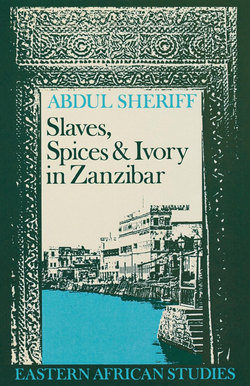Slaves, Spices and Ivory in Zanzibar

Реклама. ООО «ЛитРес», ИНН: 7719571260.
Оглавление
Abdul Sheriff. Slaves, Spices and Ivory in Zanzibar
Отрывок из книги
Reviews of
Slaves, Spices & Ivory in Zanzibar by Abdul Sheriff
.....
Plate 3 Fort Jesus, Mombasa, overlooking the town and the harbour, c. 1857
Through the impetuous mouth of a Royal Navy captain, W.F. Owen, the British lion did indeed seem to roar. In 1824 he negotiated with the Mazrui an unauthorised declaration of a British protectorate over Mombasa. Under the terms of the convention Owen not only guaranteed the ‘independence’ of Mombasa and the perpetuation of the Mazrui dynasty under British suzerainty, but also promised to reinstate it in its former possessions, Pemba, Lamu, Pate, and the Mrima coast as far south as the Pangani river. In return the Mazrui agreed to abolish the slave trade, a policy in line with what had become the constant preoccupation of the rising industrial capitalists in Britain. They also offered the British half the customs revenue of Mombasa, and freedom to British subjects to trade with the interior. This seemed to offer the prospect of a new market for British goods. As the British Governor of Mauritius, Sir Lowry Cole, put it:
.....